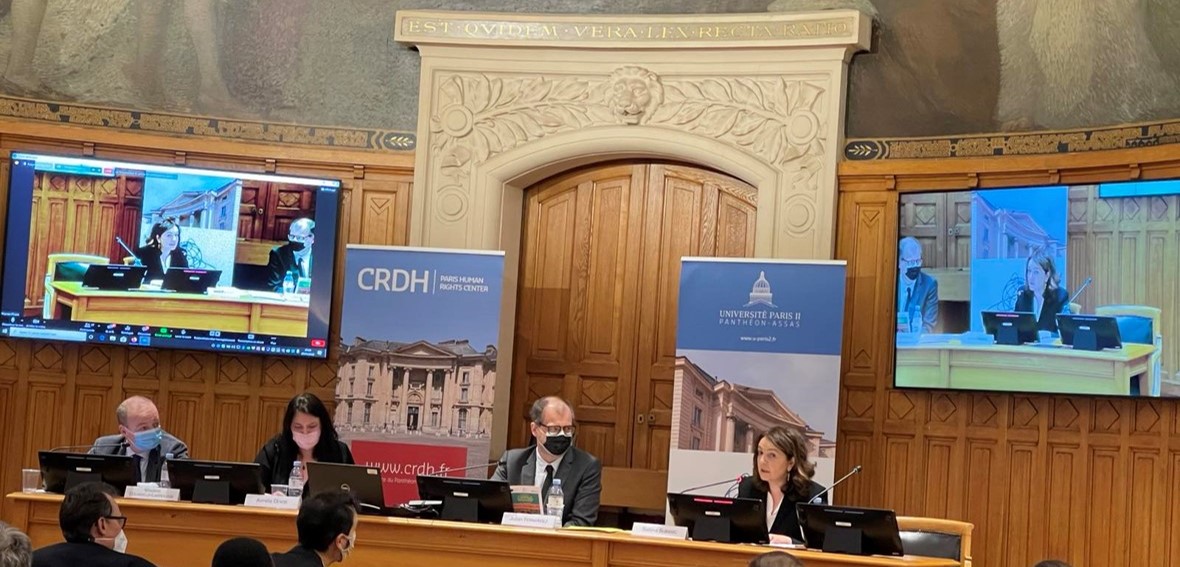It was emphasized that perpetrators of war crimes, wherever they were committed, cannot find refuge in the European Union. At the conference, there was a lot of talk about the legacy of the Hague Tribunal and the judgments pronounced for crimes committed in Bosnia and Herzegovina, and Professor Olivier de Frouville, one of the organizers of the conference, emphasizing that it is extremely important for the future of international justice to follow its development, said: Europe is defending itself in Sarajevo today".
In the ceremonial hall of the Sorbonne University in Paris, organized by the Center for Research on Human Rights and International Humanitarian Law of the University of Paris II Pantheon-Assas (CRDH), the Center for Analysis and Research in International Relations - Thucydides, and the Institute of Criminology and Criminal Law Paris (ICP ), the seventh International Criminal Justice Days were held. The goal of organizing these conferences is the exchange of experiences and opinions of legal theoreticians and practitioners in order to make an additional contribution to the development of international law and justice.
About 600 guests from the Netherlands, Belgium, France, Germany, Senegal, the USA, Canada, Algeria, the United Kingdom, Bosnia and Herzegovina participated in the conference... This year's Days of International Criminal Justice were dedicated to the activities of the International Residual Mechanism for Criminal Courts (IRMC) in The Hague, the legacy of the ICTY and the work of the permanent International Criminal Court (ICC), which was discussed by numerous distinguished speakers, including experts from the French Department for Crimes against Humanity and War Crimes, judges and prosecutors from the ICC, the permanent International Criminal Court, of the German Supreme Federal Court of Justice, representatives of the International Federation for Human Rights (FIDH), the French Ministry for Europe and Foreign Affairs (Department of International Justice), professors from the universities of Paris II Pantheon-Assas and Paris Nanterre (France), Leiden (Netherlands), Libre de Bruxelles (Belgium), Cheikh Anta Diop (Senegal), representatives of the University of Sarajevo (Bosnia and Herzegovina), lawyers who and representing cases before international courts, researchers from the French Institute for Studies and Research in Law and Justice (IERDJ).
Justice is important both for the present and for the future
Very clear messages were sent from the conference, about which there were no doubts among the participants: respecting judgments is a civilizational achievement that represents the difference between democratic and non-democratic states, because "justice is important both for the present and for the future". It was emphasized that perpetrators of war crimes, wherever they were committed, cannot find refuge in the European Union. At the conference, there was a lot of talk about the legacy of the Hague Tribunal and the judgments pronounced for crimes committed in Bosnia and Herzegovina, and Professor Olivier de Frouville, one of the organizers of the conference, emphasizing that it is extremely important for the future of international justice to follow its development, said: Europe is defending itself in Sarajevo today".

The conference was opened by international law professor Olivier de Frouville and criminology and criminal law professor Julian Fernandez, and the opening speech was given by the chief prosecutor of the Mechanism, Serge Brammertz.
In his presentation, analyzing the work of the Mechanism, Brammertz emphasized the importance of the legal practice resulting from the previous trials, especially the final judgments against Karadžić and Mladić, in which the responsibility of the high military and command leadership was identified for the crimes of genocide, crimes against humanity and war crimes, and the cases of Stanišić and Simatović, in which the role of the state structures of Serbia and their participation in the joint criminal enterprise in the crimes committed on the territory of Bosnia and Herzegovina is highlighted.
Brammertz particularly pointed to the current situation in the Western Balkans and the inadmissibility of the practice of denying verdicts and crimes committed in the territory of Bosnia and Herzegovina, as well as the glorification of war criminals in the region.
After Brammertz's introductory presentation, professor of international law Carsten Stahn (Netherlands), lawyer from the Mechanism Olivia Martlly, professor and deputy director of the Faculty of Law and Political Sciences of the University of Paris Nanterre, Anne-Laure Chaumette (France), lawyer Vincent Courcelle spoke about the work of the Mechanism. - Labrousse, first deputy president of the Court in Lille and former prosecutor of the mechanism, Auerelia Devos (France), and senior research associate of the Institute for Research on Crimes against Humanity and International Law of the University of Sarajevo, Sabina Subašić Galijatović.
Judicial and historical truth
Speaking about crimes and the consequences they leave on the victims, Professor Stahn pointed out that crimes also leave consequences on society as a whole and that this must be taken into account. In her presentation, Chaumette emphasized the importance of judicial truth, which is also the basis for historical truth. In her presentation, she critically referred to the "mathematical approach" (the number of victims in relation to the number of non-Serb inhabitants in Bosnia and Herzegovina) in determining the crime (genocide) in Bosnia and Herzegovina. municipalities in the case of Ratko Mladić, in which the majority in the Mechanism's judicial panel considered that no genocide had been committed.
Subašić Galijatović, pointing to the exceptional importance of the legacy of the Hague Tribunal and the Mechanism, pointed out that the negation of verdicts and the glorification of war crimes have been institutionalized, but also that it is now about the reactivation of the war goals that in the 1990s led to the crimes judged by the ICTY and the Mechanism: "The current the policy of the leadership of the Bosnian entity Republika Srpska, supported explicitly or implicitly by Serbia and the Russian Federation, even certain power centers of individual European Union members such as Hungary or Slovenia, is exactly the policy of the crimes described in the judgments. Today, they rehabilitate the decided policies that caused mass crimes and demand the final realization of the goals that were partially achieved by the crimes. One part was already paid when the peace agreement accepted the division of the territory, ethnically "cleansed" through crimes and recognized under the war name "Republika Srpska". The current leaders of the RS entity want to get the rest of the dividend as well - to separate the cleared territory from the rest of Bosnia and Herzegovina, which was the initial goal of the criminal policy of the joint criminal enterprise as judged before the international court."
At this panel, it was clearly stated that, especially in view of the current crisis in Bosnia and Herzegovina, crimes must not be rewarded: convictions of crimes must forever remain in the collective memory of the international community as a condemnation - not only of individuals, but of criminal policies judged by the ICTY and MMKS .
On the margins of the conference in the context of international justice, the names of the criminals sentenced in The Hague, Stanišić, Simatović, Karadžić, Mladić were most often mentioned, with the emphasis, which was also discussed in some presentations, that the legacy of The Hague is precious to everyone, and that ignoring what is international justice left a legacy of injustice to international justice.
"We owe it to the victims to be recognized"
Particularly interesting was the panel entitled "The Future of International Criminal Justice", where Joel Hubrecht, program manager of the Institute for Studies and Research in Law and Justice (IERD) from Paris, Amelie Becquart, prosecutor, head of the mission for international criminal justice at the Ministry of Europe and Foreign Affairs of France, Jasper Klinge, Chief Prosecutor of the High Federal Court of Justice of Germany, Ranaud Salomon, Chief Advocate of the Court of Cassation of France and Sarah Jamal, Professor of International Law at Pantheon Assas University in Paris.
Hubrecht spoke about the work of mixed international courts such as the Special Court in Lebanon, the mixed court for Sierra Leone, and the prospects of establishing a special court for crimes committed in Syria. On the other hand, Belliot and Kluge spoke about international justice based on the experiences of national judiciaries that work on the basis of the principle of universal jurisdiction and achievements in the trials of perpetrators of war crimes who tried to avoid justice in their countries, especially in the case of crimes committed on the territory of Bosnia and Herzegovina , Rwanda and Syria.

Let us remind you that Germany was among the first to prosecute war crimes committed in Bosnia and Herzegovina, the first to pass a verdict for the genocide in Srebrenica, and since 2011 they have been investigating and judging crimes in Syria, including rape. The Frankfurt court is also investigating crimes in Iraq. As many as six verdicts were pronounced for war crimes, crimes against humanity and genocide committed against the Yazidis in Iraq. Kluge emphasized: "We owe it to the victims to be recognized."
After the conference, the French Ministry of Foreign Affairs announced that France confirms its support for the verdicts for the perpetrators of the crimes of genocide, crimes against humanity and serious violations of international humanitarian law in Rwanda and the former Yugoslavia.
Source: Avangarda.ba
